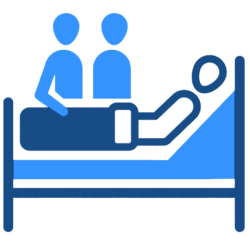Phone
(678) 745-8807Office Hours
Monday-Friday: 7am-4pmKeeping patient guidelines in mind when scheduling patients will help ensure your day goes smoothly. Patient should be scheduled based on age and medical conditions. Young pediatric patients, patient with medical conditions such as diabetes, and severe autism should be scheduled earlier as it is more difficult or risky to keep them NPO for extended periods of time.

Patient Guidelines
Age: At least 2 years old.
Minimum Weight: At least 25 lbs.
Maximum Weight: Class 2 BMI. Usually a BMI above 35 is where many of our providers will draw the limit. However, some patients may receive anesthesia at this range if they are cleared by the anesthesiologist clinically. The anesthesiologist may ask the patient if they snore loudly or have trouble breathing while sleeping. If no, they may decide to proceed. Some look at how the weight is distributed. If there is a lot of weight around the patient’s neck area, they may decide not to sedate the patient. You may plug the patient’s height and weight into any BMI calculator online to determine the BMI.
Asthma: If the patient has controlled asthma, it is okay to proceed. Signs that the patient’s asthma may be uncontrolled includes if they are on daily asthma medications, and their primary doctor continues to change their medications. The patient should be stable on their current medications for at least 3 months. Patients should continue breathing treatments as prescribed. Treatments the night before and morning of the sedation appointment are okay. Patients should bring inhalers to the procedure appointment.
Heart conditions: If the patient has an active heart condition, they will need a medical clearance from their primary doctor or cardiologist. For murmurs previously diagnosed as innocent, no clearance is needed. If the anesthesiologist discovers a murmur on the of the procedure, they will interview the patient. If the patient has never been evaluated or didn’t follow up with prior evaluation, the procedure may be delayed or cancelled pending workup.
Allergies: If the patient has an allergy to certain foods, suche as eggs, you should contact the anesthesiologist for more information. Propofol is made from a protein in egg yolks. The anesthesiologist will question the patient regarding the allergy. The anesthesiologist may alter the anesthetic based on the information received from the patient.
Seizure disorder: If the patient has had a seizure in the past 6 months, they will need a medical clearance letter from their primary doctor or neurologist. Their anesthetic may have to be adjusted. The anesthesiologist will discuss in changes in the plan prior to the procedure.
Diabetes: You should contact the anesthesiologist for instructions for patients who take insulin. Their medications may need to be adjusted the night before and morning of the sedation appointment. Patients should bring their glucometer and insulin with them to their appointment.
ADHD/ADD/Autism: These conditions do not need a medical clearance. Partients may continue medications as prescribed. Pills may be given with a small sip of water or apple juice (no other fluids allowed) up to 2 hours prior to the scheduled sedation appointment.
Other: Any patient that has an ongoing health issues will need a medical clearance from their primary doctor or medical specialist.
Vaccines: Inform parents not to take children to get vaccinated within a week of the sedation appointment time.
Make Appointment
Error: Contact form not found.
